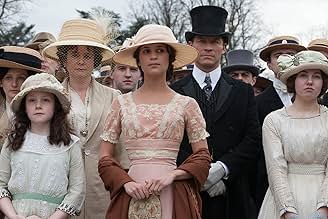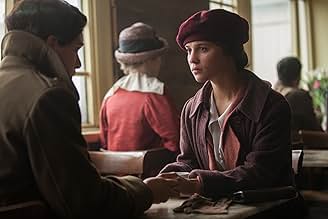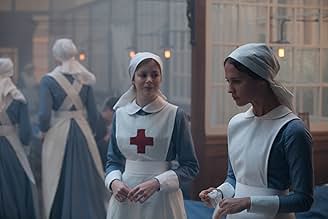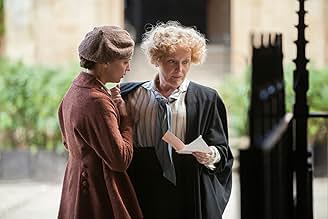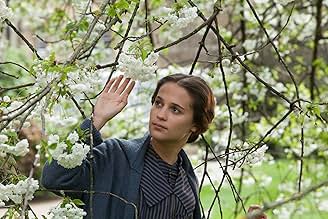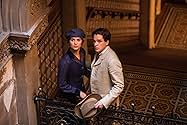IMDb RATING
7.2/10
31K
YOUR RATING
A British woman recalls coming of age during World War I - a story of young love, the futility of war, and how to make sense of the darkest times.A British woman recalls coming of age during World War I - a story of young love, the futility of war, and how to make sense of the darkest times.A British woman recalls coming of age during World War I - a story of young love, the futility of war, and how to make sense of the darkest times.
- Director
- Writers
- Stars
- Awards
- 5 wins & 7 nominations total
- Director
- Writers
- All cast & crew
- Production, box office & more at IMDbPro
Featured reviews
23 January 2015 Film of Choice at The Plaza Dorchester Tonight - Testament of Youth. Based on the book by Vera Brittain which is a best selling account of her experiences during the First World War, this film follows the life of Vera herself during those harrowing times. Starting out gently, we follow Vera, her brother and his friends from their comfortable life in the country to the eve of the war in 1914 and beyond. I say gently because this film eases you into what was one of the horrors of recent history, a time which shattered people and ruined lives forever. After fighting so hard to get to Oxford, Vera then gives it all up to become a nurse, a journey which ultimately takes her to France and gives her first hand experience of the massacre that war dishes out. There is a romantic thread running through the film but her strongest bond is with her brother and her world is torn apart when he signs up to fight. Vera was played beautifully by Alicia Vikander, a Swedish actress who I am not familiar with, but she had look of Emily Blunt in her facial expressions and mannerisms, and unfortunately did not seem to age at all during the film, not even in grief. However that is my only criticism in an elegantly shot film even when covering the abomination that is war. Another cinematic experience to make you think.
'Testament Of Youth' is a BBC film.
The film opens with a maffick, but with one young woman being rather subdued, even dazed. Then in a clever scene, there is a Col. Blimp- style swimming scene.
We are introduced to Vera Brittain, living in provincial comfort in Buxton Derbyshire, and struggling against social convention. She and her young male friends, all on the threshold of adulthood, are looking to the future. It is the summer of 1914 and the era is caught well and authentically.
Love is in the air and as our story develops we get some nice Michael Corleone-style 'Sicilian' courting. In a small part, Joanne Scanlan plays the chaperon Aunt Belle. She delivers to the part the same depth that she did when playing Mrs Catherine Dickens in last year's 'The Invisible Woman'. Played initially for laughs, the chaperon takes a much deeper and more human role as Summer moves into Autumn. There is a station scene, much more dramatic than that in the recent 'The Imitation Game', because the trains are going in a different direction.
Vera Brittain herself wrote of critics who doubted the authenticity of her account. Who are we, to measure the authenticity and depth of feeling of young lovers? This was their love, not ours! The reality of WWI, of course, can be easily measured and recounted.
The film gets progressively darker as the war intrudes into the story. The darkest scenes of all are set in France. These scenes are grim and gritty, muddy and bloody. There are many poignant scenes of love and war. Vera Brittain's male companions are played well by a strong cast. The central character of Roland Leighton is well played by Kit Harington, Here however, his romantic side is much more subdued, than that in his role in last year's 'Pompeii', where he featured in what was arguably the most romantic kiss scene of all time. Appropriately, Colin Morgan who has previously played the role of Merlin, here adds some magic, in what is perhaps the most poignant scene in this film. Perhaps the most sinister-looking figure in the film, is the innocent-faced-looking telegram-boy, played by Xavier Atkins. A small but scary part.
Pre-war Imperial Britain changed to the post-war era of Vera Brittain. The pre-war campaign for votes for women failed. The war forced women to do jobs previously done by men, to take up new roles and new responsibilities. Thus the post-war clamour for women's equality could no longer be ignored, and instead change started. The life and literature of Vera Brittain was an inspiration for the next generation, not the least being her daughter, the politician Shirley Williams. Vera Brittain's 'Testament' is now a recognized part of British culture and history. It is a long time since I read her book, but it seems to me that this film authentically captures the story in the book.
WWI was a seminal event. It changed the lives of a generation. it was a dominant theme in thinking in the inter-war period. To understand positions taken before and during WWII, we need to understand the context in which these positions were adopted.
In four short years British history was changed forever. So too for the world. This true story authentically captures the period and the resultant changes. 9/10.
The film opens with a maffick, but with one young woman being rather subdued, even dazed. Then in a clever scene, there is a Col. Blimp- style swimming scene.
We are introduced to Vera Brittain, living in provincial comfort in Buxton Derbyshire, and struggling against social convention. She and her young male friends, all on the threshold of adulthood, are looking to the future. It is the summer of 1914 and the era is caught well and authentically.
Love is in the air and as our story develops we get some nice Michael Corleone-style 'Sicilian' courting. In a small part, Joanne Scanlan plays the chaperon Aunt Belle. She delivers to the part the same depth that she did when playing Mrs Catherine Dickens in last year's 'The Invisible Woman'. Played initially for laughs, the chaperon takes a much deeper and more human role as Summer moves into Autumn. There is a station scene, much more dramatic than that in the recent 'The Imitation Game', because the trains are going in a different direction.
Vera Brittain herself wrote of critics who doubted the authenticity of her account. Who are we, to measure the authenticity and depth of feeling of young lovers? This was their love, not ours! The reality of WWI, of course, can be easily measured and recounted.
The film gets progressively darker as the war intrudes into the story. The darkest scenes of all are set in France. These scenes are grim and gritty, muddy and bloody. There are many poignant scenes of love and war. Vera Brittain's male companions are played well by a strong cast. The central character of Roland Leighton is well played by Kit Harington, Here however, his romantic side is much more subdued, than that in his role in last year's 'Pompeii', where he featured in what was arguably the most romantic kiss scene of all time. Appropriately, Colin Morgan who has previously played the role of Merlin, here adds some magic, in what is perhaps the most poignant scene in this film. Perhaps the most sinister-looking figure in the film, is the innocent-faced-looking telegram-boy, played by Xavier Atkins. A small but scary part.
Pre-war Imperial Britain changed to the post-war era of Vera Brittain. The pre-war campaign for votes for women failed. The war forced women to do jobs previously done by men, to take up new roles and new responsibilities. Thus the post-war clamour for women's equality could no longer be ignored, and instead change started. The life and literature of Vera Brittain was an inspiration for the next generation, not the least being her daughter, the politician Shirley Williams. Vera Brittain's 'Testament' is now a recognized part of British culture and history. It is a long time since I read her book, but it seems to me that this film authentically captures the story in the book.
WWI was a seminal event. It changed the lives of a generation. it was a dominant theme in thinking in the inter-war period. To understand positions taken before and during WWII, we need to understand the context in which these positions were adopted.
In four short years British history was changed forever. So too for the world. This true story authentically captures the period and the resultant changes. 9/10.
Vikander's assured performance really saves this film from being just another solemn costume drama, and it's largely thanks to her that the passion that inspired Vera Brittain's antiwar classic still shows through despite a sometimes rushed and perfunctory screenplay. Kit Harington ("Game of Thrones") is suitably intense as Vera's fiancé, Roland Leighton (didn't recognize John Snow at first in his new guise as beardless nature poet).
The camera may seem to dwell too much on idyllic country scenes and beautiful vistas at the expense of plot and character, though that does help to heighten the contrast between Vera's privileged but restricted prewar life and the new life of purpose and endless horror that awaits her at a field hospital in France. The camera's used most effectively when the two worlds collide-to illustrate Roland's poem addressed to the corpse of a German soldier found lying in a patch of wildflowers, most of all in the panorama of a boundless field of dead and dying men surrounding the hospital after a "big push" (which echoes the famous crane shot after the Battle of Atlanta in "Gone with the Wind"). I'll let the nitpickers figure out if the Leightons' house on the South Coast really did have a magnificent view of what looks like the White Cliffs of Dover, but the stormy shoreline makes the perfect backdrop for a scene in which Roland returns angry and shellshocked from the front
The basic storyline-Vera's service in France and her romance with Roland Leighton-is skillfully dramatized and very moving; her struggle with the conventions of Georgian family life is somewhat less involving, one exception being an ironic episode in which she's summoned back from the front to deal with a family "crisis," only to find that her mother's gotten sick and has fallen behind with the housework
The much-praised '79 series with Cheryl Campbell only seems to be available on VHS and Region 2 DVD; I wouldn't hesitate in recommending this gorgeous and affecting new version as an alternative.
The camera may seem to dwell too much on idyllic country scenes and beautiful vistas at the expense of plot and character, though that does help to heighten the contrast between Vera's privileged but restricted prewar life and the new life of purpose and endless horror that awaits her at a field hospital in France. The camera's used most effectively when the two worlds collide-to illustrate Roland's poem addressed to the corpse of a German soldier found lying in a patch of wildflowers, most of all in the panorama of a boundless field of dead and dying men surrounding the hospital after a "big push" (which echoes the famous crane shot after the Battle of Atlanta in "Gone with the Wind"). I'll let the nitpickers figure out if the Leightons' house on the South Coast really did have a magnificent view of what looks like the White Cliffs of Dover, but the stormy shoreline makes the perfect backdrop for a scene in which Roland returns angry and shellshocked from the front
The basic storyline-Vera's service in France and her romance with Roland Leighton-is skillfully dramatized and very moving; her struggle with the conventions of Georgian family life is somewhat less involving, one exception being an ironic episode in which she's summoned back from the front to deal with a family "crisis," only to find that her mother's gotten sick and has fallen behind with the housework
The much-praised '79 series with Cheryl Campbell only seems to be available on VHS and Region 2 DVD; I wouldn't hesitate in recommending this gorgeous and affecting new version as an alternative.
Having read some of the negative remarks regarding the film makers' decision to not show extensive scenes from the mucky trenches, I must respectfully disagree. From War Horse to the Wipers Times, there have been quite a few films over the last few years that covered the horrifying reality of life in the trenches of Europe.
I found this to be a well-acted and balanced presentation. It has left me with a lingering sadness and I feel that it has accomplished the purpose of showing the viewers the aching emptiness and futility of war. No one in this story escaped the impact of the World War I years. Although most of the focus is on Vera, we do see the anguish of the others who surround her throughout those years.
Previously unfamiliar with the back-story of this writer, I was very satisfied with the film portrayal of her life.
I found this to be a well-acted and balanced presentation. It has left me with a lingering sadness and I feel that it has accomplished the purpose of showing the viewers the aching emptiness and futility of war. No one in this story escaped the impact of the World War I years. Although most of the focus is on Vera, we do see the anguish of the others who surround her throughout those years.
Previously unfamiliar with the back-story of this writer, I was very satisfied with the film portrayal of her life.
I first read "Testament of Youth" during university and was captivated by the emotionally moving real-life story of love and loss during war. The memoir spurred me on to read more about Vera Brittain, particularly during the World War I period that is the setting of "Testament of Youth." Having read her diary "Chronicle of Youth" and "Letters from a Lost Generation" long before watching this film, I had formed a strong attachment to Vera Brittain almost as if she was a personal friend. Reading her words, it is very easy for anyone, particularly a young, studious person to relate to her and the blossoming romance she describes between herself and her first love, Roland Leighton.
As such, I had extremely high expectations for this film, and was skeptical that Alicia Vikander and Kit Harington would be "my" Vera and Roland--I had such a fixed idea of them in my head. Fortunately Alicia and Kit's performances met my expectations. They had wonderful chemistry and the relationship as portrayed captured the essence of Vera and Roland: the intelligent, witty banter, sweet/innocent flirtatiousness, passion and angst. This relationship is at the heart of the memoir and is the driving force for much of what occurs during and after its commencement, so it was very important for this relationship to be portrayed accurately and to be emotionally moving for the audience, which it certainly was for me.
Supporting characters played by Taron Egerton (Edward) and Colin Morgan (Victor) were also wonderfully portrayed, which was a relief as the relationships with her brother and friend are extremely important in the memoir as well, and just as emotionally moving as the romance between Vera and Roland. As far as the other aspects of the film are concerned, the stirring scenes at the hospital where Vera volunteers as a nurse are gripping and faithfully portray the tumultuous wartime experiences that Vera describes in her memoir.
The highlight for me was the poetry of Roland which is interwoven during key moments in the film. This is a lovely element to the story that I found very touching and it provides a beautiful, emotional backdrop for key scenes.
I really hope this film spurs those who haven't read the memoir/have never heard of Vera Brittain to go on and read "Testament of Youth." The book certainly lingered in my mind for quite some time after I had first read it, and the film likewise recaptured those feelings for me.
As such, I had extremely high expectations for this film, and was skeptical that Alicia Vikander and Kit Harington would be "my" Vera and Roland--I had such a fixed idea of them in my head. Fortunately Alicia and Kit's performances met my expectations. They had wonderful chemistry and the relationship as portrayed captured the essence of Vera and Roland: the intelligent, witty banter, sweet/innocent flirtatiousness, passion and angst. This relationship is at the heart of the memoir and is the driving force for much of what occurs during and after its commencement, so it was very important for this relationship to be portrayed accurately and to be emotionally moving for the audience, which it certainly was for me.
Supporting characters played by Taron Egerton (Edward) and Colin Morgan (Victor) were also wonderfully portrayed, which was a relief as the relationships with her brother and friend are extremely important in the memoir as well, and just as emotionally moving as the romance between Vera and Roland. As far as the other aspects of the film are concerned, the stirring scenes at the hospital where Vera volunteers as a nurse are gripping and faithfully portray the tumultuous wartime experiences that Vera describes in her memoir.
The highlight for me was the poetry of Roland which is interwoven during key moments in the film. This is a lovely element to the story that I found very touching and it provides a beautiful, emotional backdrop for key scenes.
I really hope this film spurs those who haven't read the memoir/have never heard of Vera Brittain to go on and read "Testament of Youth." The book certainly lingered in my mind for quite some time after I had first read it, and the film likewise recaptured those feelings for me.
Did you know
- TriviaSaoirse Ronan was originally cast as Vera Brittain but she dropped out due to scheduling conflicts. Alicia Vikander replaced her.
- GoofsAs Roland and Vera meet in late 1914 before he leaves for France, Aunt Belle notices that Roland is sick and she talks about how influenza is ripping through the troops and it's in all the newspapers "Spanish Influenza they call it." The earliest known case of what would only later be called the Spanish flu was in March of 1918--and reports of the plague were zealously suppressed in the press of the belligerent nations for fear that it damaged morale. The only reason the disease, which actually was first documented in Kansas, was named "Spanish Flu", was because Spain was neutral in the war and the Spanish papers were free to report cases, giving the wrong impression elsewhere that Spain was hit first and harder by the disease.
- Quotes
Roland Leighton: Down the long white road we walked together. Down between the grey hills and the heather. You seemed all brown and soft, just like linnet. Your errant hair had shadowed sunbeams in it. And there shone all April in your eyes.
- Crazy creditsDuring the opening credits, World War I guns can be heard in the background.
- ConnectionsFeatured in Film '72: Episode #44.1 (2015)
- SoundtracksSilver Threads Among the Gold
Written by H.P. Danks & Eben E. Rexford
Performed by John McCormack
Source: Library and Archives
Canada/Silver Threads Among the Gold
1922/AMICUS 31399658
- How long is Testament of Youth?Powered by Alexa
Details
- Release date
- Countries of origin
- Official sites
- Languages
- Also known as
- Testament of Youth
- Filming locations
- Keighley Railway Station, Station Bridge, Keighley, Bradford, West Yorkshire, England, UK(railway station scenes)
- Production companies
- See more company credits at IMDbPro
Box office
- Gross US & Canada
- $1,822,250
- Opening weekend US & Canada
- $53,000
- Jun 7, 2015
- Gross worldwide
- $5,851,758
- Runtime
- 2h 9m(129 min)
- Color
- Sound mix
- Aspect ratio
- 2.39 : 1
Contribute to this page
Suggest an edit or add missing content







